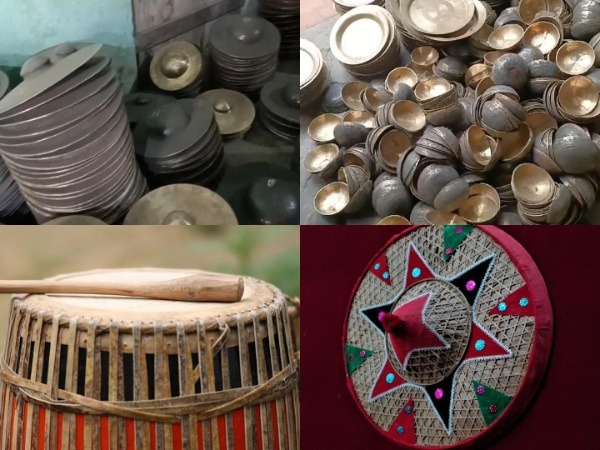Guwahati (Assam) [India], April 1 (ANI): As many as 19 traditional products and crafts of Assam, including Bihu Dhol’, Jaapi’ and several items of the Bodo community, have been accorded with the Geographical Indication (GI) tag, Chief Minister Himanda Biswa Sarma said on Sunday.
These traditional products and crafts include the Assam Bihu Dhol, Assam Jaapi, Sarthebari Metal Craft, Assam Pani Mateka Craft, Assam Asharikandi Terracotta Craft, Assam Mising Handloom Products and several items of the Bodo community.
“A big win for Assam’s heritage! Six prestigious GI Tags have been granted to traditional crafts with support from NABARD, RO Guwahati, and facilitated by Padma Shri Dr Rajani Kant, GI Expert. This includes iconic items like Assam Bihu Dhol, Japi, Sarthebari Metal Craft, and more. These products, deeply rooted in history, support nearly one lakh people directly,” CM Sarma said in a post on X.
“What a better day than Bodofa’s birth anniversary to receive the GI tags for 13 articles that embody the rich cultural heritage of our Bodo community. This recognition will greatly boost the promotion of the items and in taking forward the legacy of these cultural items,” CM Sarma added.
Pramod Boro, Chief Executive Member of Bodoland Territorial Council (BTC) also said that the 13 articles that have received the prestigious GI Tag are of immense pride for all of Bodoland community.
“Today is a day of immense pride for all Bodoland, as on the birth anniversary of Bodofa UN Brahma, 13 articles that embody Bodo identity have received the prestigious GI Tag from the Geographical Indication Registry, Government of India,” said Pramod Boro.
Centuries-old handicraft industry – the Sarthebari bell-metal industry is the second largest handicraft sector in Assam after bamboo craft and currently around 2000 artisans are engaged in the Sarthebari bell-metal craft industry.
Sarthebari in the Barpeta district is a place well known for its metal products making clusters like bell-metal and brass-metal work and developing a variety of products since generations which have been recognised 2,000 years back also as one of the most useful and prominent products from the one of the holiest place in the country situated in the Kamrup geographical region of Assam.
The common objects made by the artisans in Sarthebari are kalah (water pot), sarai (a platter or tray mounted on a base), kahi (dish), bati (bowl), lota (water pot with a long neck) and tal (cymbals).
The technology involved in making the objects is traditional and simple. The main tools are anvils of different sizes locally known as balmuri, chatuli and akue, hammers, pincers, flies, chisels and some minor equipment.
Locally they are called Dulaii, Gasha, Saria, Piri, Khanta (an iron instrument used for polishing the bell metal products), Pocker etc.
These artisans inherit the knowledge from their elders and thus the craft sector runs on the hereditary system. Modern tools and technology have not yet touched the lives of the artisans and they still adhere to primitive tools and equipment in bell-metal production.
Historically, this craft form dates back to the 7th century AD. Various written records reveal that the bell metal industry of Assam existed from the time of Kumar Bhaskarvarman, the king of the Varman Dynasty, when, the Kumar of eastern India gifted drinking vessels to Harshavardhana of Kannauj.
Despite facing numerous problems, and challenges, the artisans are engaging to preserve their ancestral craft.
The Assam Bihu Dhol is a drum-like musical instrument from Assam with a barrel shape carved and hollowed out of a single piece of quality wood.
The right head is larger and has a louder pitch than the left side. Both the faces of the Bihu Dhol are enclosed with thin leather. It is tightened with the support of ‘Gajra’ (the outer diameter of the dhol head), similar to Tabla and it is interlaced to the shell and hoop on the other side by thin but solid leather straps.
Bihu Dhol is the most valued musical instrument for the Assamese, a vital part of its folk festival and tradition. Bihu Dhol becomes more relevant when the festival in question is Bihu itself.
This special Dhol is beaten along the Rongali Bihu dance and songs like Bihu Naam, are performed during the occasion.
Expressing his gratitude to the government, Nabajit Deka, a shopkeeper of Guwahati who sells Sarthebari bell-metal products told ANI, “It is a great moment for Assam that Sarthebari Metal Craft and other traditional products, craft of Assam get GI tag.”
“We are so happy for this. I would like to thank the government for this,” Nabajit Deka added. (ANI)
Disclaimer: This story is auto-generated from a syndicated feed of ANI; only the image & headline may have been reworked by News Services Division of World News Network Inc Ltd and Palghar News and Pune News and World News
HINDI, MARATHI, GUJARATI, TAMIL, TELUGU, BENGALI, KANNADA, ORIYA, PUNJABI, URDU, MALAYALAM
For more details and packages











